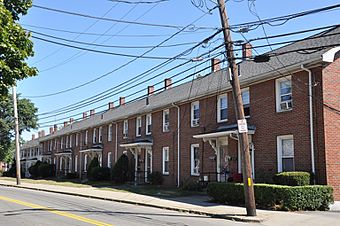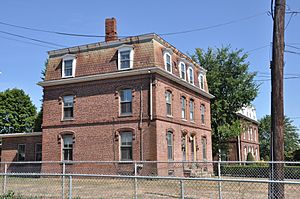Boston Manufacturing Company Housing facts for kids
Quick facts for kids |
|
|
Boston Manufacturing Company Housing
|
|

380–410 River St., 2010 photo
|
|
| Location | 153–165 and 380–410 River St., Waltham, Massachusetts |
|---|---|
| Architectural style | Italianate |
| MPS | Waltham MRA |
| NRHP reference No. | 89001534, 89001535 |
| Added to NRHP | September 28, 1989 |
The Boston Manufacturing Company Housing refers to old homes in Waltham, Massachusetts. These homes were built for workers of the Boston Manufacturing Company (BMC). The BMC was one of America's first modern factories. These historic buildings were added to the National Register of Historic Places in 1989. They show how factory workers lived long ago.
Exploring the Homes at 153–165 River Street
These two buildings are on the north side of River Street. They are made of brick and have 2-1/2 stories. Their special "mansard roofs" create a full third floor. Each building has a balanced look with four window sections. Two entrances are in the middle.
The doors and windows have rounded tops. They are decorated with brickwork. The building at 163-165 still has its original slate roof. The Boston Manufacturing Company built these homes around 1870. They were likely for managers or higher-level employees.
Discovering the Homes at 380–410 River Street
The homes at 380-410 River Street are a set of "rowhouses." Rowhouses are homes built side-by-side in a row. These are on the south side of River Street. One part has six wooden homes. The other part has ten brick homes.
Both sections are two stories tall with pointed roofs. The entrances to the homes are in pairs. They are covered by small roofs called "hoods" or "porticos." These covers are supported by fancy brackets or posts. The BMC built these homes in the 1880s as the company grew. This type of housing was common in Waltham. These rowhouses are some of the few that still look much like they did back then.




